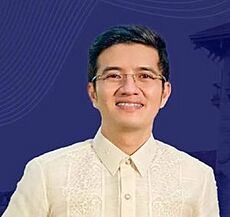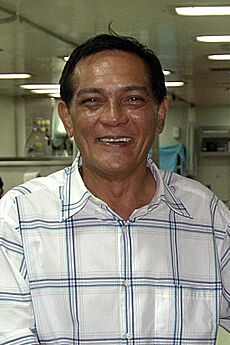Government of Zamboanga City facts for kids
The Government of Zamboanga City is like the main team that runs the City of Zamboanga. It's a special kind of government where a mayor leads, and a council helps make decisions. The President of the Philippines and the Secretary of the Interior and Local Government oversee how it works.
The city government has three main parts that work together:
- The legislative branch makes the laws.
- The executive branch carries out the laws.
- The judicial branch makes sure laws are fair and settles disagreements.
These parts get their powers from a special rulebook called the 1991 Local Government Code of the Philippines.
Making City Laws: The Legislative Department
The power to make laws for Zamboanga City belongs to the Sangguniang Panglungsod, also known as the City Council. It's a single group that includes:
- The Vice Mayor, who leads the meetings and is chosen by all the city's voters.
- Eight councilors from each of the city's two main areas. They are elected for three years.
- The head of the Liga ng mga Barangay (a group of village leaders) from the city. They are a member because of their position.
- The president of the Sangguniang Kabataan (a youth council) from the city. They are also a member because of their position.
Elected council members can be re-elected, but they can't serve more than three terms in a row.
If a spot on the City Council becomes empty, the President of the Philippines chooses someone to fill it. If the youth or village leader spots become empty, the next person in line from their group automatically takes the place.
Running the City: The Executive Department
The Mayor is in charge of running the city and making sure laws are put into action. The current Mayor is John M. Dalipe.
The Mayor is chosen by the people in an election and serves for three years. A mayor can be re-elected, but not for more than three terms in a row.
The Vice Mayor, Josephine Pareja, is the second-highest official. They are also elected by the people. If the Mayor's job becomes empty, the Vice Mayor steps in. The Vice Mayor also leads the meetings of the City Council.
The Mayor has many assistants who help run different parts of the city. These include:
- City Treasurer (manages money)
- City Accountant (keeps financial records)
- City Budget Officer (plans how money is spent)
- City Planning and Development Coordinator (helps plan the city's future)
- City Engineer (oversees building projects)
- City Health Officer (looks after public health)
- City Civil Registrar (keeps records of births, deaths, and marriages)
- City Administrator (helps manage daily operations)
- City Legal Officer (gives legal advice)
- City Veterinarian (cares for animal health)
- City Social Welfare and Development Officer (helps people in need)
- City General Services Officer (manages city property and services)
Some other helpers the city can choose to have are:
- City Architect
- City Information Officer
- City Agriculturist
- City Population Officer
- City Environment and Natural Resources Officer
- City Cooperatives Officer
A Look Back: Historical Governments
The Republic of Zamboanga
Long ago, from May to November in 1899, Zamboanga had its own independent government called the Republic of Zamboanga. Its leader was Vicente Álvarez. He and his soldiers had helped free the people of Zamboanga from Spanish rule.
Álvarez dreamed of his republic ruling over all of Mindanao, Basilan, and Sulu. But in reality, the Republic of Zamboanga only controlled the area that is now roughly the size of Zamboanga City.
Leaders of the Republic
| Mayor | Took office | Left office | |
|---|---|---|---|
| 1 | Vicente Alvarez | May 18, 1899 | November 16, 1899 |
| 2 | Isidro Midel | November 16, 1899 | March 1901 |
| 3 | Mariano Arquiza | March 1901 | March 1903 |
Under the Moro Province
In March 1903, the Republic of Zamboanga ended. The United States took over, and Zamboanga became the capital of a larger area called the Moro Province. This province included five districts: Sulu, Zamboanga, Lanao, Cotabato, and Davao.
How Zamboanga's Leaders Changed Over Time
In 1911, Zamboanga became a city with a special commission government. It had a mayor and two commissioners.
Then, in 1937, a new city government started. The mayor was chosen by the President of the Philippine Commonwealth.
Later, in 1955, a new law made the mayor's job something people could vote for. This is also when the Vice Mayor position was created.
When the Moro Province was replaced in 1914, Zamboanga went back to being a municipality (a smaller town-like area) under the Zamboanga province. During this time, it had "Municipal Presidents" instead of mayors. The way Zamboanga's leaders were chosen changed several times, from being appointed to being elected by the people.
Zamboanga City Officials: Recent Years
2019–2022 Officials
| Position | Name |
|---|---|
| Mayor | Hon. Maria Isabelle Climaco-Salazar |
| Vice Mayor | Hon. Rommel S. Agan |
| First District | |
| Representative | Hon. Cesar L. Jimenez, Jr. |
| Councilors | Pareja, Josephine E. |
| Atilano, Elbert | |
| Olaso, Khymer Adan T. | |
| Macrohon, Joselito A. | |
| Valesco, Rogelio Jr L. | |
| Jimenez, Cesar M. | |
| dela Cruz, Crisanto B. | |
| Omaga, El King K. | |
| Second District | |
| Representative | Hon. Manuel Jose M. Dalipe |
| Councilors | Dalipe, John M. |
| Guingona, Benjamin IV | |
| Elago, Juan Climaco P. | |
| Nuño, Lilibeth M. | |
| Alavar, Miguel III C. | |
| Edding, Al-Jihan R. | |
| Villaflores, Jimmy B. | |
| Elago, Vincent Paul A. | |
| Ex-officio Councilors | |
| ABC President | Hon. Jerry E. Perez |
| SK Federation President | Hon. Cary John O. Pioc |
| Representative of the Indigenous Peoples | Hon. Tungkuh Hanapi |
2022–2025 Officials
| Position | Name |
|---|---|
| Mayor | N/A |
| Vice Mayor | N/A |
| First District | |
| Representative | N/A |
| Councilor | N/A |
| Second District | |
| Representative | N/A |
| Ex-officio Councilors | |
| ABC President | N/A |
| SK Federation President | N/A |
| Representative of the Indigenous Peoples | N/A |
Choosing Leaders: The 2022 Zamboanga City Local Elections
Local elections happened in Zamboanga City on May 9, 2022. During these elections, people voted for their local leaders. This included the mayor, vice mayor, and eight councilors for each district.
|
|||||||||||||||||
|
Mayoral elections
|
|||||||||||||||||
|
|||||||||||||||||
|
Vice Mayoral elections
|
|||||||||||||||||
|
|||||||||||||||||
|
|||||||||||||||||
 | Emma Amos |
 | Edward Mitchell Bannister |
 | Larry D. Alexander |
 | Ernie Barnes |



